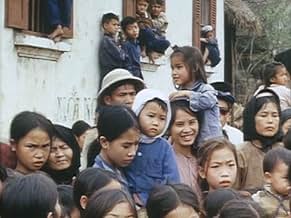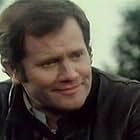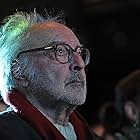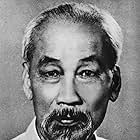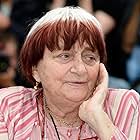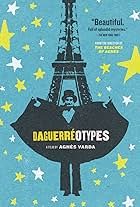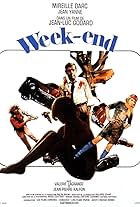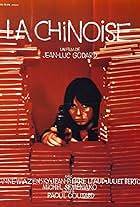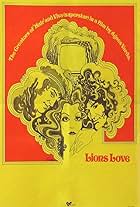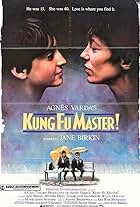In seven different segments, Godard, Klein, Lelouch, Marker, Resnais, and Varda show their sympathy and support for the North Vietnamese army during the Vietnam War.In seven different segments, Godard, Klein, Lelouch, Marker, Resnais, and Varda show their sympathy and support for the North Vietnamese army during the Vietnam War.In seven different segments, Godard, Klein, Lelouch, Marker, Resnais, and Varda show their sympathy and support for the North Vietnamese army during the Vietnam War.
- Awards
- 1 win & 1 nomination
Maurice Garrel
- Narrator
- (voice)
Valérie Mayoux
- Narrator
- (voice)
Ho Chí Minh
- Self (segment "Flash Back")
- (archive footage)
Michèle Ray-Gavras
- Narrator (segment "Victor Charlie")
- (voice)
- (as Michèle Ray)
William C. Westmoreland
- Self (segment "Why We Fight")
- (archive footage)
Marie-France Mignal
- (segment "Claude Ridder")
- (uncredited)
Storyline
Did you know
- TriviaRight-wing extremists destroyed part of the Kinopanorama Cinema, and assaulted the manager, at avenue La-Motte-Piquet, Paris, while screening Far From Vietnam: 19th September 1967.
- ConnectionsEdited into Histoire(s) du cinéma: Une vague nouvelle (1999)
Featured review
Given the plethora of World Cinema names associated with it, this documentary obviously dealing with the war then being waged by the U.S. in South East Asia, has something of an unassailable reputation among films of its type; still, having gone through a number of titles from Godard's political phase and, more recently, Lelouch's LIVE FOR LIFE (1967) – which had incorporated images of physical torture and military maneuvers amid chintzy romantic complications! – I was wary of the prospect, to say the least!! Incidentally, I have a TV-to-VHS recording of this (with Italian subtitles) somewhere and had intended watching it as part of a marathon commemorating Godard's 80th birthday in 2010
but I now acquired an English-friendly edition in time for my tribute to the late Resnais. Anyway, the movie emerged a decidedly fascinating – if necessarily heady – concoction: at nearly 2 hours, it did eventually prove tiresome for a rainy Sunday afternoon's viewing...but not before the subject itself had been exhausted by delving into all the various angles and sides of the conflict!
Divided into segments to better delineate each film-maker's contribution, the pacing and interest level inevitably come across as uneven throughout but, all things considered, there were – surprisingly enough – perhaps more pros than cons to the picture! Among the better sequences were Godard's typically innovative approach: an admirably candid admission that he decided to fill his movies (even before officially forsaking mainstream cinema for over a decade!) with political slogans, thus demonstrating his alliance with several causes the world over, because he was refused entry in most countries where these struggles were taking place (include Vietnam)! Resnais' involved actor Bernard Fresson ranting, amid the spouting of anti-American declarations, about how one could live contentedly knowing (from extensive – and exclusive – TV coverage of the war) what was going on around us, all the while being observed by an attractive yet bored- looking girl.
Other sections depict an interview with Cuban revolutionary Fidel Castro (who would have thought he would still be around nearly 50 years later?!) denoting how guerrilla warfare is essential to the underdog for reversing the odds in any given conflict; an American Quaker widow, with a brood of children in tow, serenely recounts how her impetuous husband took rather extreme measures to demonstrate where his sympathies lied – setting himself on fire in front of the Pentagon building!; since filming of this took place during the Lyndon B. Johnson administration, opposition to the war was not as widespread (thanks largely to sugar- coated reports – broadcast, in very scarce reception, on national TV – grossly perverting the veracity of the situation!) as it would be subsequently when Richard Nixon occupied the White House – so that we get simultaneous street rallies both for and against the (still- controversial) policy of American interventionism, and including a Jew doing impromptu eccentric chants built around the word "Napalm"!!; most instructively, the backstory of the Vietnamese occupation (which France gladly relinquished to the U.S. in the mid-1950s) is related in some detail; one episode, then, is called "Why We Fight" – possibly in tribute to the classic series of WWII documentaries supervised by Frank Capra yet making for an ironic moniker in this case, since the U.S. is pretty much seen as the villain now!; we also learn that the Americans derisively refer to the Viet-Cong forces as "Victor Charlie" (in the same way the German and Japanese enemy used to be dubbed "Jerry" and "Mr. Tojo" respectively by them for the duration of WWII)!; finally, the most chilling statement to be found here was the prophetic one made by a black activist (which I mistakenly took to be Malcolm X!) – who was of the opinion that the American people were too far removed from Vietnam (hence the movie's title) to really care, and that it would take an affront carried out on their proper soil in order to extract the desired reaction out of them!!
Divided into segments to better delineate each film-maker's contribution, the pacing and interest level inevitably come across as uneven throughout but, all things considered, there were – surprisingly enough – perhaps more pros than cons to the picture! Among the better sequences were Godard's typically innovative approach: an admirably candid admission that he decided to fill his movies (even before officially forsaking mainstream cinema for over a decade!) with political slogans, thus demonstrating his alliance with several causes the world over, because he was refused entry in most countries where these struggles were taking place (include Vietnam)! Resnais' involved actor Bernard Fresson ranting, amid the spouting of anti-American declarations, about how one could live contentedly knowing (from extensive – and exclusive – TV coverage of the war) what was going on around us, all the while being observed by an attractive yet bored- looking girl.
Other sections depict an interview with Cuban revolutionary Fidel Castro (who would have thought he would still be around nearly 50 years later?!) denoting how guerrilla warfare is essential to the underdog for reversing the odds in any given conflict; an American Quaker widow, with a brood of children in tow, serenely recounts how her impetuous husband took rather extreme measures to demonstrate where his sympathies lied – setting himself on fire in front of the Pentagon building!; since filming of this took place during the Lyndon B. Johnson administration, opposition to the war was not as widespread (thanks largely to sugar- coated reports – broadcast, in very scarce reception, on national TV – grossly perverting the veracity of the situation!) as it would be subsequently when Richard Nixon occupied the White House – so that we get simultaneous street rallies both for and against the (still- controversial) policy of American interventionism, and including a Jew doing impromptu eccentric chants built around the word "Napalm"!!; most instructively, the backstory of the Vietnamese occupation (which France gladly relinquished to the U.S. in the mid-1950s) is related in some detail; one episode, then, is called "Why We Fight" – possibly in tribute to the classic series of WWII documentaries supervised by Frank Capra yet making for an ironic moniker in this case, since the U.S. is pretty much seen as the villain now!; we also learn that the Americans derisively refer to the Viet-Cong forces as "Victor Charlie" (in the same way the German and Japanese enemy used to be dubbed "Jerry" and "Mr. Tojo" respectively by them for the duration of WWII)!; finally, the most chilling statement to be found here was the prophetic one made by a black activist (which I mistakenly took to be Malcolm X!) – who was of the opinion that the American people were too far removed from Vietnam (hence the movie's title) to really care, and that it would take an affront carried out on their proper soil in order to extract the desired reaction out of them!!
- Bunuel1976
- Mar 10, 2014
- Permalink
- How long is Far from Vietnam?Powered by Alexa
Details
- Release date
- Country of origin
- Official site
- Languages
- Also known as
- Fern von Vietnam
- Filming locations
- Production company
- See more company credits at IMDbPro
Box office
- Gross US & Canada
- $8,132
- Opening weekend US & Canada
- $1,125
- Sep 1, 2013
- Gross worldwide
- $8,132
Contribute to this page
Suggest an edit or add missing content





